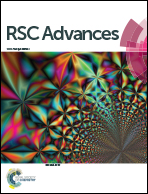Nanonet-structured poly(m-phenylene isophthalamide)–polyurethane membranes with enhanced thermostability and wettability for high power lithium ion batteries†
Abstract
To solve the thermal shrinkage, flammability and wettability problems of conventional polyolefin separators, we have prepared the nanonet-structured poly(m-phenylene isophthalamide)–polyurethane (PMIA–PU) nanofibrous membranes with enhanced thermostability and good wettability for high power lithium ion batteries (LIBs) via a one-step electrospinning technique. The as-prepared PMIA–PU membranes demonstrate improved mechanical strength (>15.79 MPa) and high ionic conductivity up to 1.38 mS cm−1 due to the introduction of PU and the formation of the nanonet structure. Benefiting from the introduction of PMIA, the as-prepared PMIA–PU membranes were endowed with not only improved thermostability and non-flammability but also excellent wettability to liquid electrolytes, which could be beneficial for improving the safety and reliability of LIBs. Moreover, the excellent affinity between the carboxy group (PMIA and PU) and the carbonate ester group of the liquid electrolyte endows the PMIA–PU membranes with good anodic stability up to 4.86 V. More importantly, the PMIA–PU membrane based Li/LiFePO4 cell exhibits comparable cycling stability, delivering a discharge capacity of 160 mA h g−1 at the 65th cycle and better rate capability compared with the Celgard membrane based cell. These results indicate a very promising direction for safe and reliable separators, which may make further progress in obtaining the enhanced performance of LIBs.


 Please wait while we load your content...
Please wait while we load your content...